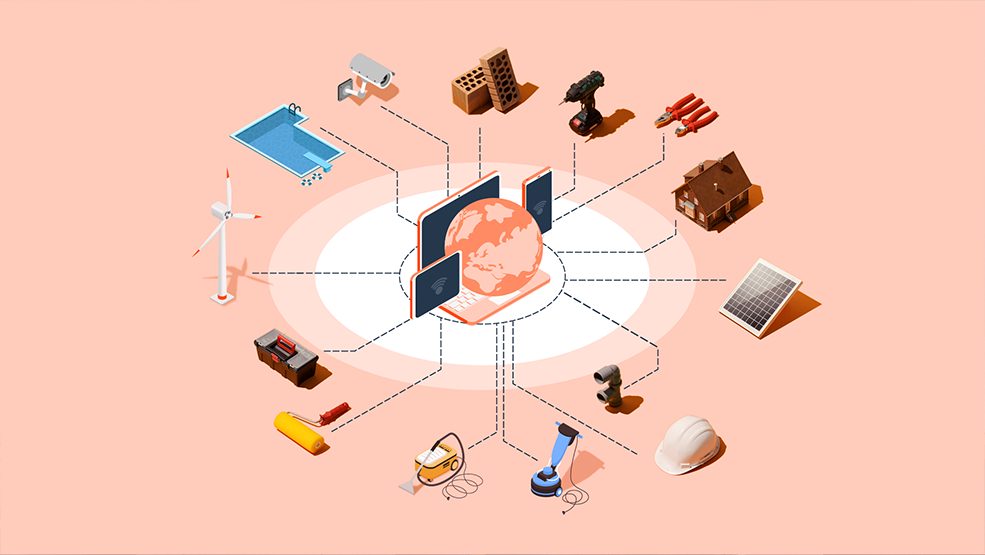According to a recent Mckinsey report, IoT devices worldwide are expected to reach 43 billion by 2023. IoT has certainly got a lot of attention in recent years with its distinctive ability to connect and monitor various devices, applications, and platforms.
But that’s not the only thing about it. Its time-saving and cost-effective features make compelling reasons for businesses to adopt it. IoT helps businesses predict repairs that will need to happen before failure occurs—preventing them from becoming real issues. It conveniently solves problems caused by manual intervention and associated errors.
IoT is transforming almost every industry we can think of. And field service businesses are no exception. It is taking the field service industry by storm with its readily available solutions for optimizing the service cycle, sending instant alerts, reducing setup costs, and providing GPS tracking.
As the FSM industry faces a considerable amount of implications due to the development of IoT, service businesses need to focus on the potential impacts IoT has on every aspect of their operations. This article will talk about the connection between IoT and field service and explain how IoT is reshaping the field service industry.
How IoT and the field service industry are connected?
The Internet of Things is commonly used in many industries with a field service component. But the sector where it is valued the most is the manufacturing and energy industries. This is because IoT aligns so well with the needs of both of these industries, bringing with it advantages such as intelligent sensors, actionable analytics, and real-time monitoring.
To elaborate on this, IoT empowers the energy industry by giving valuable insights into power consumption, hardware maintenance, forecasting, and pricing. In manufacturing industries like HVAC, asset monitoring is a recurring problem. IoT-enabled sensors help to address this problem by remote monitoring of assets, systematic monitoring, providing in-depth analysis, and assisting with resource optimization.
How is IoT changing the field service industry?
The adoption of the Internet of Things represents a paradigm shift for the field service industry. Because the IoT eliminates tedious field service processes and replaces them by giving you the opportunity to implement truly data-driven solutions.
But, the impact of IoT on field service is wider than just analytics. There are many reasons for a field service business to implement IoT into their workflow. We have compiled a list for you. IoT helps field service businesses in the following ways:

1. Increasing first-time fix rates
IoT brings data-driven solutions to your field service business. This data helps technicians and enhances the customer experience by promoting first-time fix rates. Thanks to internal sensors, IoT equipment can accurately pinpoint and identify faults.
Using this data, field technicians can know the service history of a piece of equipment before arriving on site. Knowing what they are dealing with—before getting on-site—allows a technician to arrive with all the necessary tools and parts to successfully resolve issues in a single visit.
2. Capturing real-time data
Real-time data is the foundation for work orders like scheduling, dispatching, and invoicing. Real-time updates are necessary for the long-term success of field service businesses. By using IoT devices such as GPS and embedded sensors, the field service industry can access real-time data of field service operations in detail, providing management with an improved workflow.
3. Sending instant alerts
One of the biggest benefits of deploying IoT in the field service sector is the ability to send immediate alerts. With its cutting-edge technology, IoT can communicate with various systems and devices immediately and efficiently. IoT sensors synchronized with field service management software transfers data between connected devices. This data is used to send updates and messages to customers as instant alerts.
4. Improving customer satisfaction
IoT enables automation and digitization. As a result, customer’s no longer have to frequently check on their equipment as the monitoring process is taken care of by the IoT device. If something goes wrong, smart sensors send a notification before a complaint is even registered. Field technicians can then be dispatched to fix the problem. This results in happier customers and simpler, less expensive fixes.
5. Minimizing equipment downtime
IoT minimizes equipment downtime by identifying malfunctions before they occur. When you can predict problems before they occur, you can fix them quickly—before it becomes something more expensive or difficult to repair. This is thanks to analytics and reporting.
Analytical data can reveal if a product or component is operating as expected or if it needs maintenance. Data like this can predict equipment breakdowns before they happen, minimizing downtime and ensuring more cost-effective fixes. Everything becomes simpler with the Internet of Things.
6. Reducing setup costs
Although it seems far-fetched, IoT can assist field service businesses in regulating cash flow with data-driven analytics and monitoring. IoT provides precise data that helps identify trends and explore what repairs may need to happen soon—preventing unnecessary failures and expenses. Field service businesses can plan accordingly and invest only where necessary.
7. Monitoring assets better
It is not feasible to constantly check your assets manually, but IoT can help. Sensors in devices that are enabled with IoT connectivity can periodically monitor assets’ giving feedback on the current status and if maintenance is required. This automatic process lengthens the lifespan of your assets and helps to maintain their safety.
8. Connecting with mobile applications
We already discussed how IoT could send instant alerts using real-time data. But, to access this information and make it usable, it should be accessible in a mobile application. IoT ensures connectivity with multiple smart devices by implementing various types of connectivity.
By using Bluetooth, Wi-Fi, RFID, NFC, and more, IoT can quickly connect to various smart devices, ensuring that communication is simple and straightforward for technicians, customers, and back-office teams.
9. Enhancing reporting capabilities
The field business sector relies heavily on reports to assess and track business growth. Analytical reports help narrow the focus to a specific problem. Given its importance and the sheer size of the task, collecting and compiling usable data would be challenging for a human workforce.
Yet, an IoT device can ease the reporting process by interacting with other systems and services. IoT-enabled devices connect all field service modules—facilitating real-time reporting. By employing solutions such as this, businesses can track statistics and perform income analysis. They can even gain insight into employee performance, helping dispatchers make better decisions regarding job assignments.
Conclusion
IoT is a game-changer for the field service industry. It influences the expansion of the field with systemic monitoring, reporting, and analytics. IoT decreases downtime of equipment, enhances real-time monitoring, increases first-time fix rates, and streamlines service cycles. Implementing IoT reduces risks and saves time and money.
However, IoT is only the latest trend, but in the field service industry, technologies keep changing—there is always something new. To stay up-to-date with the current technological trends, subscribe to our newsletter.



